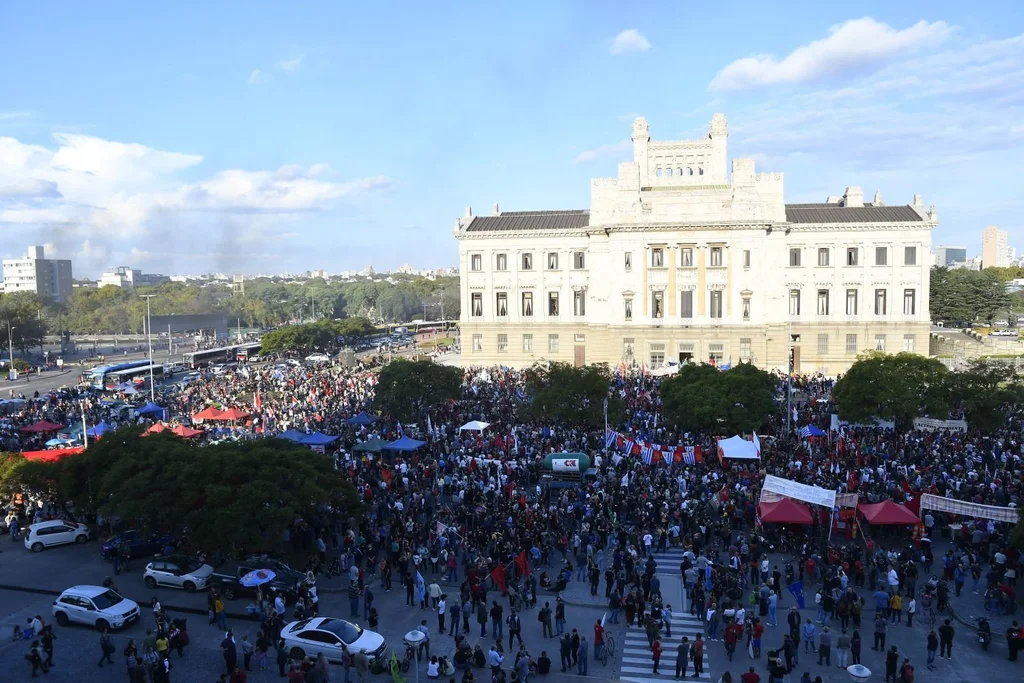“The eight-hour law is old,” he said Marcelo Abdalapresident of the PIT-CNT, during the act of May 1, and stressed that the flag of the labor movement will be that of “the reduction of the working day without a reduction in salary”.
The union leader called on the government to think about this issue, because, according to what he said, “we are falling behind, not only in the European concert but with our neighboring countries”, referring to Chile, which lowered the work week from 45 hours to 40 in the last few weeks.
By law, the working day in Uruguay is eight hours, and those employees who work beyond that hour in a single job per day are entitled to receive overtime. According to the National Institute of Statistics (INE), with data updated to March of this year, the average effective hours in the country is 35.6.
However, data from the International Labor Organization (ILO) indicate that Uruguay has a weekly working day of 34.6 hours, on average, according to the latest update — dated April 25 — of the ranking called Statistics of wages and working time.
It should be noted that this index considers the formal and informal sector. This was explained to BBC Mundo by the specialist Najati Ghosheh, who works at the ILO headquarters in Geneva, Switzerland, referring to Latin America: “What happens is that in some countries only the time worked is measured in the formal sector and not the marginalwhere there are more workers who only get employment by the hour, which lowers the average.” In Uruguay, the data also includes the informal sector. In turn, according to the same indicator, 12% of Uruguayan employees work 49 hours or more per week.
In Europe, for example, the working day varies between countries between 30.1 and 38.2 hours per week.

Photo: Leonardo Carreno.
Hundreds of workers gathered in the Plaza 1° de Mayo for the PIT-CNT act on International Workers’ Day.
Which countries work more
In Spain, the average hours worked per week is 36.4although 7% of employees work 49 hours or more per week. Some companies in this country already implement the four-day work weekby which the weekly working hours are reduced to 32 hours.
In Belgium, where the government has also approved the four-day work week, without loss of wages, the average work week is 35.1 hours, while 8% of employees work 49 hours or more.
France is the country with the lowest average weekly hours worked in Europe: 30.1, according to information from the ILO. In that country, 9% of the working population does 49 hours or more per week. On the contrary, the European country with the highest average is Portugal, in which 38.2% of hours per week are workedand where 8% of employees work 49 hours per week or more.
The Italian weekly working day is 36.1 hours, the same as that of Luxembourg; the British one is 35.6 hours and the Swedish one is 35.2 hours.
Some countries like Germany, Switzerland, and Denmark have similar work weeks, averaging 34.3, 34.4, and 34.5 hours, respectively. While in Norway the weekly working day is 33.5 hours and in Slovakia 33.4.
The vision of the political system
The reduction of the working day opened a debate that is not new and several political and union actors made reference to that request of the unionized workers.
He former president Jose Mujica He assured that the drop in the hourly load “is sung that it will come, I don’t know when. Domingo Arena already announced it. It will come for the most lucid, even from the employer sectors themselves.” And the Minister of Labor and Social Security, Paul MieresHe stated at a press conference that “The issue of reducing working hours is not on the government’s agenda today”.
The minister did not rule out that modifications on this issue could be discussed in areas of collective bargaining, although he maintained that it is necessary to be clear that the modifications will vary greatly depending on each sector of activity and its possibilities. According to him, he said, to think about the reduction of working hours, productivity cannot be left aside.
“It is very difficult to think about the feasibility of a modification where a reduction in working time can be promoted and at the same time a maintenance of remuneration and a maintenance of production,” he mentioned.
Former President Mujica reflected on this issue and added: “Do you know where the contradictions are? The consumer society is so big that they give us six hours of work and we get two jobs and work more than before. We ourselves stepped on the callus, that’s why we have to fight ”.
















